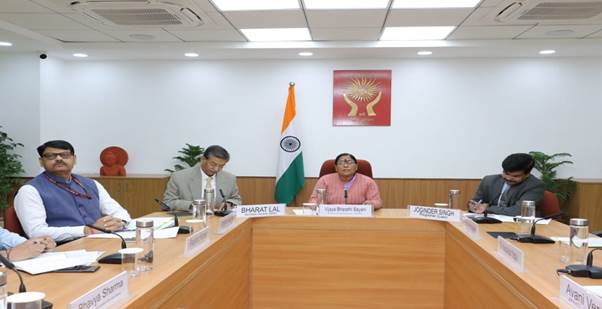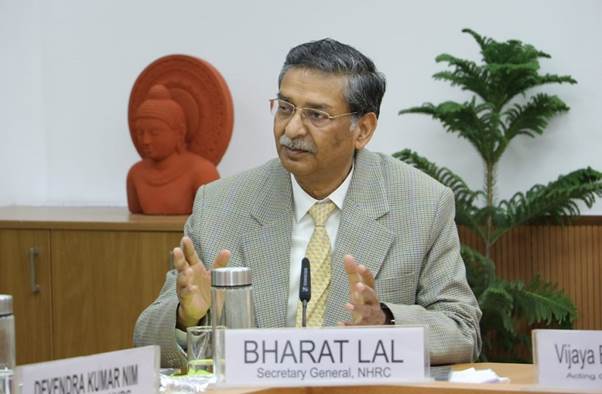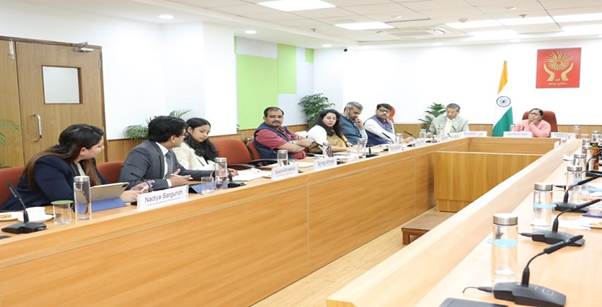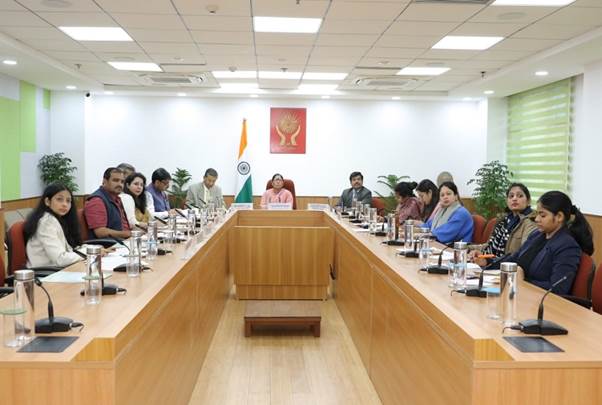National Human Rights Commission
NHRC, India organises an open house discussion on the rights of gig workers
Regulatory frameworks needed to address the challenges faced by gig workers, says NHRC, India Acting Chairperson, Smt Vijaya Bharathi Sayani
NHRC, India Secretary General, Shri Bharat Lal emphasises the implementation of various laws and the Social Security Code 2020 to ensure gig workers welfare
Ensuring minimum wage enforcement and income transparency at aggregator levels to bridge gender disparities stressed
Among various other suggestions, review of arbitrary rating system of gig workers service without providing any opportunity of hearing to them highlighted
General and specific welfare schemes by aggregators, including health benefits, accident insurance, old-age protection, and unemployment safeguards in case of accidents also suggested
Posted On:
23 DEC 2024 4:15PM by PIB Delhi
The National Human Rights Commission (NHRC), India organised an open house discussion on the rights of gig workers in hybrid mode at New Delhi. In her keynote address, NHRC, India Acting Chairperson, Smt Vijaya Bharathi Sayani said that there is a need for targeted efforts through regulatory frame works to address gig worker’s challenges, including long working hours, financial strain, and physical exhaustion. She said that over 83% of app-based drivers work more than 10 hours daily. This puts them under the physical and mental strain added by policies like "10-minute deliveries and unrealistic targets which also result in avoidable accidents. Women face additional challenges such as safety risks, erratic schedules, and physical demands, discouraging their participation and raising concerns about their well-being.

Before this, triggering the discussions, the NHRC, India Secretary General, Shri Bharat Lal said that it is crucial to check the implementation of laws such as the Social Security Code 2020 and the various other labour laws in India to ensure Gig Workers welfare. He also noted that some states like Karnataka, Rajasthan and Jharkhand are focusing on providing social security to gig workers but more needs to be done to address their other major concerns relating to health insurance, minimum wages, stress-free working conditions protecting their dignity.

The discussions were held in three technical sessions – ‘Informality of the Gig workers’ social security benefits and their legal ambiguity’, ‘Deprivation of health, mental health, safety and security of gig workers’ and ‘Gender disparity and financial instability for women gig workers’.

Some of the suggestions emanated from the discussions included:
• There is a need for targeted efforts and regulatory frameworks to address the challenges faced by gig workers including long working hours, financial strain, and physical exhaustion;
• All the Companies engaging should provide general and specific welfare schemes, including health benefits, accident insurance, old-age protection, and unemployment safeguards in case of accidents etc;
• Support women gig workers with maternity benefits, crèche facilities, and the establishment of rest points through public-private partnerships;
• Explore and expand the e-Shram portal as a valuable tool in aiding gig workers;
• Set up a grievance redressal mechanism, particularly for women gig workers and build awareness around POSH (Prevention of Sexual Harassment) policies to ensure a safer work environment;
• Build financial literacy of gig workers to promote transparency besides providing opportunities to upscale their skills through vocational training programmes;
• Ensure minimum wage enforcement and income transparency in all sectors engaging gig workers by the aggregators to bridge gender disparities;
• Develop schemes addressing the risks posed by climate challenge and ensure worker safety during extreme weather conditions by the employing companies;
• Review rating system of gig workers service which is arbitrary without providing any forum to them to hear the Gig workers’ point of view.

The participants included NHRC, India Registrar (Law), Shri Joginder Singh, Joint Secretary, Shri Devendra Kumar Nim, Dr K. Rajeswara Rao, Former Special Secretary, NITI Aayog, Shri Nikhil MR, Assistant Labour Commissioner Labour Department Government of Karnatata, Shri O.P. Sarhan, Joint Secretary and Additional Labour Commissioner, Labour Department, Government of Rajasthan, Dr. Vinay Kumar Chauhan, Managing Director National Labour Cooperative Federation of India Ltd, Ms Bhavya Sharma, Director of Corporate Communication and ESG at Urban Company, Shri Akash Gupta, Co-founder & CEO, Zypp Electric, Ms. Tannaz Ahmed, Manager – Public Policy, Zypp Electric, Shri Prashant Kumar, Senior Head - Public Policy Ola Electric, Shri Rohit Kumar, General Counsel, Ola electric, Shri Shaik Salauddin, President-TGPWU IFAT-NGS, Ms Nadiya Sarguroh, Associate Partner, MZM Legal LLP, Shri Swapnil Srivastava, Senior Associate MZM Legal LLP, Shri Harish Chander, Deputy Director, NCVET, Dr Dhanya, M.B. Faculty, V.V. Giri National Labour Institute and Shri Rahul Jain, Head-HR Big Basket.
*****
NSK
(Release ID: 2087280)
Visitor Counter : 1070